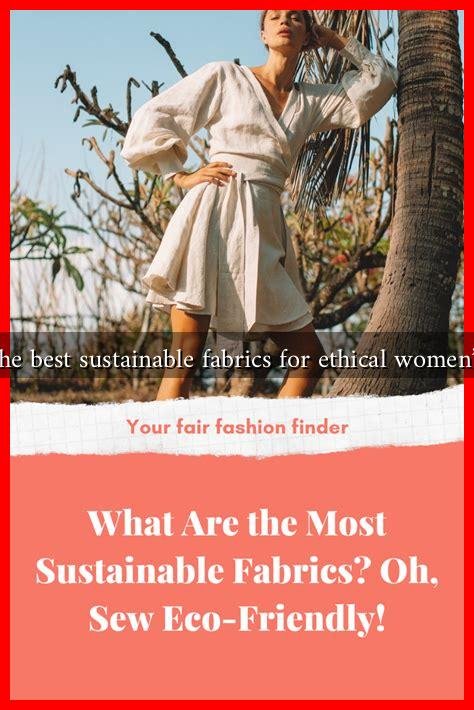-
Table of Contents
What are the Best Sustainable Fabrics for Ethical Women’s Clothing?
As the fashion industry grapples with its environmental impact, the demand for sustainable fabrics has surged. Ethical women’s clothing is not just a trend; it represents a conscious choice to support eco-friendly practices and promote social responsibility. This article explores some of the best sustainable fabrics available today, highlighting their benefits, production processes, and examples of brands that utilize them.
Understanding Sustainable Fabrics
Sustainable fabrics are materials that are produced with minimal environmental impact and often involve ethical labor practices. These fabrics can be derived from natural sources, recycled materials, or innovative processes that reduce waste. Here are some of the most popular sustainable fabrics used in ethical women’s clothing:
1. Organic Cotton
Organic cotton is grown without synthetic pesticides or fertilizers, making it a healthier choice for both the environment and farmers. The production of organic cotton uses 91% less water than conventional cotton, which is crucial in water-scarce regions.
- Benefits: Biodegradable, soft, and breathable.
- Brands: Companies like Patagonia and Eileen Fisher prioritize organic cotton in their collections.
2. Tencel (Lyocell)
Tencel, also known as Lyocell, is made from sustainably sourced wood pulp, primarily from eucalyptus trees. The production process is closed-loop, meaning that solvents used in the manufacturing are recycled, minimizing waste.
- Benefits: Soft, moisture-wicking, and biodegradable.
- Brands: Reformation and Nudie Jeans incorporate Tencel into their designs.
3. Hemp
Hemp is one of the most sustainable fabrics available. It requires little water, no pesticides, and grows quickly, making it an eco-friendly choice. Additionally, hemp fabric is durable and becomes softer with each wash.
- Benefits: Strong, breathable, and UV resistant.
- Brands: Patagonia and Hemptique offer hemp-based clothing options.
4. Recycled Polyester
Recycled polyester is made from post-consumer plastic bottles and other plastic waste. This fabric helps reduce landfill waste and the need for virgin polyester, which is derived from petroleum.
- Benefits: Lightweight, durable, and moisture-wicking.
- Brands: Nike and Adidas have embraced recycled polyester in their activewear lines.
5. Linen
Linen is made from the flax plant, which requires fewer resources to grow compared to cotton. It is biodegradable and has a low environmental impact. Linen is also known for its breathability and natural texture.
- Benefits: Strong, absorbent, and gets softer with each wash.
- Brands: Everlane and OshKosh B’gosh feature linen in their collections.
Conclusion
Choosing sustainable fabrics for ethical women’s clothing is a powerful way to support environmental conservation and ethical labor practices. Fabrics like organic cotton, Tencel, hemp, recycled polyester, and linen not only reduce the fashion industry’s carbon footprint but also offer consumers stylish and comfortable options. As more brands commit to sustainability, consumers can make informed choices that align with their values. By opting for clothing made from these sustainable materials, we can collectively contribute to a more ethical and eco-friendly fashion industry.
For more information on sustainable fashion practices, consider visiting resources like the Sustainable Fashion Forum.

